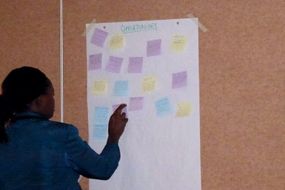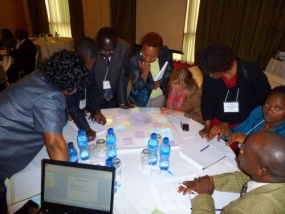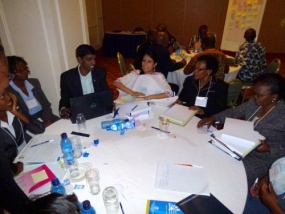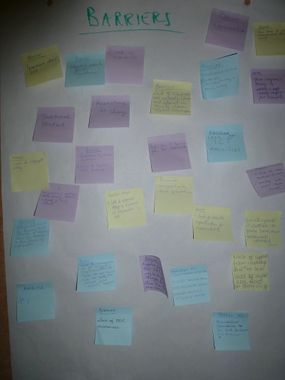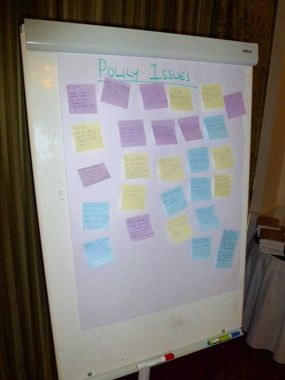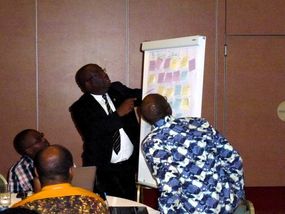Opportunities, barriers and policy issues
From WikiEducator
Drawing on the three regional case studies case studies, symposium participants were invited to identify the most important:
for harnessing the potential of open education approaches for the benefit of the formal and informal education sectors in the region. The contributions were written on sticky notes. Small groups were tasked with classifying and adding any missing elements and the outputs are recorded on this page. Participants and interested visitors to this page are most welcome to add to the list below. |
Contents
Opportunities
Opportunities identified by the symposium delegates were grouped as follows:Widening access
- Leveraging OER for provision of education at all levels of delivery
- OER provides access to relevant and quality learning materials in different formats
- OER can respond to meeting the education demand
- OER can widening access to higher education
- OER facilitates effective use of ICT infrastructure
Building capacities
- Using OER to build capability through training in ICT and other related skills to enahnce knowledge in ICT, design and open education and other related fields.
Provision of teaching and learning resources
- Collaborative creation and reuse of resources
- Quality considerations - potential of OER to enhance quality and standards of materials
- Potential for OER to ensure relevance and ability to serve diverse learning needs
- Flexibility of OER for use, adaptation and adoption models
Collaboration, partnerships and networking
- OER facilitates greater collaboration, partnerships through information sharing thus enhancing networking
Improving equity
- OER enhances equity through opening up access and participation from rural and marginalised communities to learning for development
Barriers
Opportunities identified by the symposium delegates were grouped as follows:
Cultural
- Conservatism
- Traditional mindset
- Resistance to change
- Creating a paradigm shift among different cultures
- Social and cultural diversity
- Working with people from multiple cultures
Policy
- Lack of incentives to use and create OER
- Influence, interference and blocking by people currently benefiting from corruption
- Absence of open intellectual policies
- Lack of support from leadership due to low level of awareness of OER and open access resources
- Need for strong advocacy for open education
Infrastructure
- Slow pace of ICT infrastructure development to support OER
- Lack of equipment, affordable and reliable Internet connectivity particularly in remote areas (Intenet interruptions)
Attitudes
- Negative attitudes and resistance to OER
- Resistance from "analalgue" lecturers favouring traditional classroom delivery
- Unwillingness of authors’ to freely have their material uploaded for sharing
- Negative perceptions that Technical Vocation Education and Training can only be offered through face-to-face rather than other means.
Capability development
- Ignorance about OER
- Lack of capacity in knowledge on how to use and modify OER
- Higher levels of ignorance on OER from various stakeholders
- Lack of appropriate strategies for capability development on OER implementation
- Lack of awareness about OER
- Standardized accreditation could be a barrier to OER implementation
Policy issues
Policy issues identified by the symposium delegates were grouped as follows:Fostering open policy development and adoption
- Promoting use of Creative Commons licenses for all materials produced by civil servants from taxpayer revenue
- Promoting the adoption of open policy so that all school materials are published as OER thus contributing to sustainability, educationally appropriate use of copyright and patents and increasing availability of educational resources.
Encouraging digital and open content development
- Integration of open learning philosophies in core areas of education
- Investing in training and support for OER creation, use and adaptation
- Need to computerize
- Government sponsored content should be published on OER platforms
- Facilitating OER content development and distribution in multiple languages
Absent/ inadequate policy
- Lack of national OER policies
- Need to develop institutional policies on development of OER to guide OER design and development
- OER policy frameworks should be developed in countries to enhance efficiency
- Policy requirements relation to adoption and reuse of OER for local environments
- Lack of clear developed policy and regulatory framework for OER implementation in the country
- For sustainability of OER, there should be policy
- Encourage review of current university policies
- Investment in OER at the policy level in Education
- Need for receptive and dynamic open policy
- Bandwidth affordability policy
- The need for Cross boarder / cultural policies relating to OER
- No clear cut policies for information sharing amongst institutions
- Considerations for parallel development of quality assurance policies for OER
- Mainstreaming OER as part of institutional activities
Advocacy and awareness
- How to make government accept parity of esteem between "OER degrees" and "traditional degrees"
- Sector wide exposure on knowledge about OER
- OER is critical for broadening access and success in Technical and Vocational educational training programs
Value proposition (gains and losses)
- Lack of guidance and information on gains and losses
- Institutional and national level policy need to recognize OER in order for resources to be made available (time /Money)
- Sustainability of Open schooling
- Need for continuity when funded project end (designing for fiscal sustainability)
ICT infrastructure
- Bandwidth
- Improvement of Connectivity
- Cost and financing
Requirements for successful open policy development
- Capacity building in OER and policy development
- Monitoring and evaluation
- Promoting collaboration and partnerships
- Specifying achievement targets and corresponding strategies to achieve them.
- Inclusivity (in development etc)
- Anchoring policies to parent ministries (Ownership).


